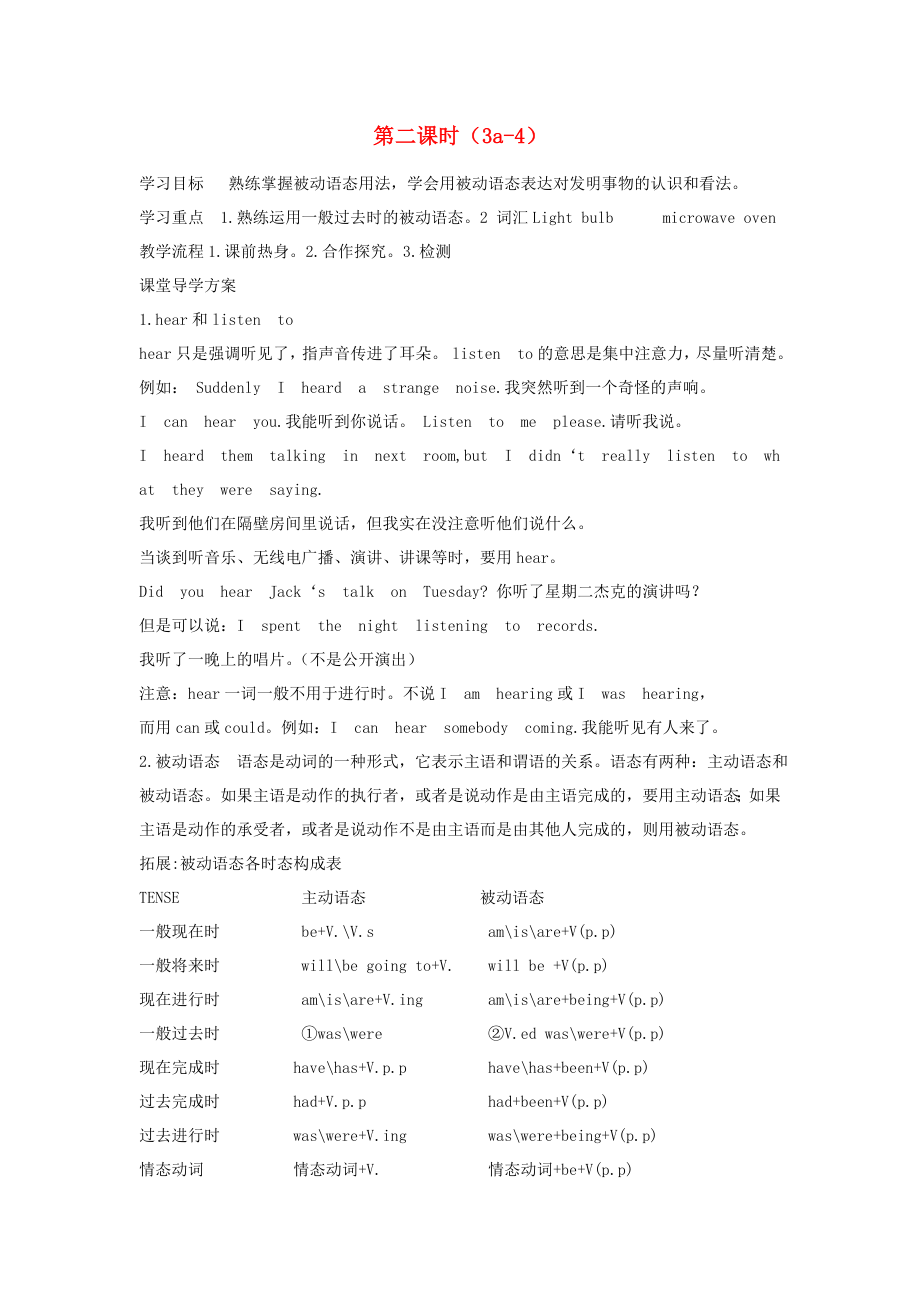《黑龍江省黑河市愛輝鎮(zhèn)中學(xué)九年級(jí)英語全冊(cè) Unit 9 When was it invented 2導(dǎo)學(xué)案(無答案) 人教新目標(biāo)版》由會(huì)員分享���,可在線閱讀,更多相關(guān)《黑龍江省黑河市愛輝鎮(zhèn)中學(xué)九年級(jí)英語全冊(cè) Unit 9 When was it invented 2導(dǎo)學(xué)案(無答案) 人教新目標(biāo)版(2頁珍藏版)》請(qǐng)?jiān)谘b配圖網(wǎng)上搜索�。
1、第二課時(shí)(3a-4)
學(xué)習(xí)目標(biāo) 熟練掌握被動(dòng)語態(tài)用法��,學(xué)會(huì)用被動(dòng)語態(tài)表達(dá)對(duì)發(fā)明事物的認(rèn)識(shí)和看法��。
學(xué)習(xí)重點(diǎn) 1.熟練運(yùn)用一般過去時(shí)的被動(dòng)語態(tài)�。2 詞匯Light bulb microwave oven
教學(xué)流程1.課前熱身。2.合作探究����。3.檢測(cè)
課堂導(dǎo)學(xué)方案
1.hear和listen?to?
hear只是強(qiáng)調(diào)聽見了,指聲音傳進(jìn)了耳朵。 listen?to的意思是集中注意力�����,盡量聽清楚�����。
例如: Suddenly?I?heard?a?strange?noise.我突然聽到一個(gè)奇怪的聲響���。
I?can?hear?you.我能聽到你說話�����。 Listen?to?
2����、me?please.請(qǐng)聽我說�。
I?heard?them?talking?in?next?room,but?I?didn‘t?really?listen?to?what?they?were?saying.
我聽到他們?cè)诟舯诜块g里說話,但我實(shí)在沒注意聽他們說什么����。
當(dāng)談到聽音樂、無線電廣播����、演講��、講課等時(shí)��,要用hear����。
Did?you?hear?Jack‘s?talk?on?Tuesday? 你聽了星期二杰克的演講嗎��?
但是可以說:I?spent?the?night?listening?to?records.
我聽了一晚上的唱片�。(不是公開演出)
注意:hear一詞
3、一般不用于進(jìn)行時(shí)�。不說I?am?hearing或I?was?hearing,
而用can或could�。例如:I?can?hear?somebody?coming.我能聽見有人來了�。
2.被動(dòng)語態(tài) 語態(tài)是動(dòng)詞的一種形式,它表示主語和謂語的關(guān)系����。語態(tài)有兩種:主動(dòng)語態(tài)和被動(dòng)語態(tài)。如果主語是動(dòng)作的執(zhí)行者����,或者是說動(dòng)作是由主語完成的���,要用主動(dòng)語態(tài);如果主語是動(dòng)作的承受者��,或者是說動(dòng)作不是由主語而是由其他人完成的�,則用被動(dòng)語態(tài)。
拓展:被動(dòng)語態(tài)各時(shí)態(tài)構(gòu)成表
TENSE 主動(dòng)語態(tài) 被動(dòng)語態(tài)
一般現(xiàn)在時(shí) be+V.\V.s
4��、 am\is\are+V(p.p)
一般將來時(shí) will\be going to+V. will be +V(p.p)
現(xiàn)在進(jìn)行時(shí) am\is\are+V.ing am\is\are+being+V(p.p)
一般過去時(shí) ①was\were ②V.ed was\were+V(p.p)
現(xiàn)在完成時(shí) have\has+V.p.p have\has+been+V(p.p)
過去完成時(shí) had+V.p.p
5�、 had+been+V(p.p)
過去進(jìn)行時(shí) was\were+V.ing was\were+being+V(p.p)
情態(tài)動(dòng)詞 情態(tài)動(dòng)詞+V. 情態(tài)動(dòng)詞+be+V(p.p)
3. 感官動(dòng)詞或使役動(dòng)詞使用省略to的動(dòng)詞不定式,主動(dòng)語態(tài)中不帶to ����,但變?yōu)楸粍?dòng)語態(tài)時(shí),須加上to ���。
例:make somebody do something→ somebody+ be +made to do something
see somebody do something→ somebody +be
6���、 +seen to do something
1.A girl saw my wallet drop when she passed by. →My wallet was seen to drop by a girl when she passed by.
2.The boss made the little boy do heavy work .→The little boy was made to do heavy work by the boss.
達(dá)標(biāo)檢測(cè)
1. People speak English in many countries. English _____ _
7、____ _____ ___in many countries.
2. We built this bridge last year. This bridge _______ _______ _______ ______ last year.
3. The tiger in the zoo frightened the little girl.
? The girl ________ _______ by the tiger in the zoo.
4. Xiao Liu has invited you to a lunch party.
? You _______ __
8���、_____ _______ _______ _______ ________ to a lunch party.
5. You must not take these magazines out of the reading-room.
? These magazines _______ ______ ______ ______ _______ the reading-room.
6. We shall discuss the problem at tomorrow's meeting.
?? The problem _______ _______ _______ by us at tomorrow.
用所給詞的適當(dāng)形式填空
1.MPS is used for (play) music. 2. He has two (radio).
3. A computer is one of (use) inventions in the world.
4. How many magazines can (borrow) form the library every week?
5. He has (invent) many things in his life.
 黑龍江省黑河市愛輝鎮(zhèn)中學(xué)九年級(jí)英語全冊(cè) Unit 9 When was it invented 2導(dǎo)學(xué)案(無答案) 人教新目標(biāo)版
黑龍江省黑河市愛輝鎮(zhèn)中學(xué)九年級(jí)英語全冊(cè) Unit 9 When was it invented 2導(dǎo)學(xué)案(無答案) 人教新目標(biāo)版

